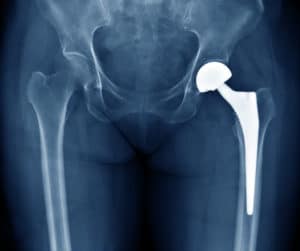A joint is where the ends of two or more bones meet. There are different types of joints within the body. For example, the knee is considered a “hinge” joint, because of its ability to bend and straighten like a hinged door. The hip and shoulder are “ball-and-socket” joints, in which the rounded end of one bone fits into a cup-shaped area of another bone. If you have a damaged or arthritic joint, you may be advised to have joint replacement surgery. Our orthopedic surgeons at Summit Healthcare Orthopedic Center perform joint replacement surgery in Show Low, Arizona.
What is joint replacement surgery?
Total joint replacement is a surgical procedure in which parts of an arthritic or damaged joint are removed and replaced with a metal, plastic or ceramic device called a prosthesis. The prosthesis is designed to replicate the movement of a normal, healthy joint. Hip and knee replacements are the most commonly performed joint replacements, although replacement surgery can be performed on other joints, as well, including the ankle, wrist, shoulder, and elbow.

When is total joint replacement surgery recommended?
Several conditions can cause joint pain and disability, which leads patients to consider joint replacement surgery. In many cases, joint pain is caused by damage to the cartilage that lines the ends of the bones (articular cartilage). This may be from arthritis, a fracture, or another condition. If nonsurgical treatments like medications, physical therapy, and changes to your everyday activities do not relieve your pain and disability, your doctor may recommend total joint replacement.
Different Types of Joint Replacements
Hip Replacement
Hip replacement is one of the most successful operations performed in the medical world. As we age as a population, the need is growing all the time. Hip replacement can make a real difference in the life of the patient, in effect allowing the person to return to a pain-free life once again. Hip replacement involves addressing both the bone and the socket. The damaged ball of the thighbone is replaced with a metal ball; the socket is ground clean of damage and a metal socket is inserted into it for the new metal ball to pivot within.
Knee Replacement
During a total knee replacement surgery, your damaged knee joint is replaced with an artificial joint, also known as a prosthesis. This surgery almost always reduces joint pain and improves your quality of life. With your newly restored knee, you can return to normal activities, that limited you before. Your orthopedic surgeon will secure the parts of the prosthesis to the bones of your knee, and together they will form your new joint.
Partial Knee Replacement
Osteoarthritis sometimes develops in only one partition of the knee, while the other two partitions remain relatively healthy. If you have osteoarthritis in only one partition, you may be a candidate for partial knee replacement. A partial knee replacement resurfaces only the damaged cartilage of the knee, preserving the undamaged cartilage. Since a partial knee replacement repairs only one side of the knee, the prosthesis parts are much smaller than they are with a total knee replacement surgery.
Preparing for Joint Replacement Surgery
Before total joint replacement, we suggest that you print out a list of questions and take it with you when with your orthopedic surgeon. Summit Healthcare Orthopedic Center provides you with JointCOACH on-line education, Guidebook with lots of pertinent information and an Orthopedic Program Manager to help you throughout the process.

Four Weeks Before Surgery
About a month before your procedure, you may find it helpful to understand your joint anatomy. You may want to read answers to common questions prior to orthopedic surgery. Once you have scheduled your surgery, you will be provided a guidebook.
Three Weeks Before Surgery
About three weeks before joint replacement surgery, we recommend preparing your home and making important items easily accessible for after your surgery.
It may be easier for you to make and freeze meals, or stock up on frozen dinners before your orthopedic surgery. This way, meal preparation is easier and requires less effort. You should plan on making enough meals for up to two weeks. We suggest you contact friends and family for support. You may need help with activities such as driving, shopping, and moving items in your home.
Two Weeks Before Surgery
Two weeks prior to your scheduled surgery, you will attend the Pre-Operative Joint Class. Please bring all of your medications and supplements with you to this class. Following the class, you will meet with your pharmacy to review your medications, perform pre-admission testing such as lab work and EKGs. You will also meet with the Perioperative Coordinator to review your medical history. You may also meet with an anesthesia provider.
You will need to avoid anti-inflammatory medications before your procedure. Your orthopedic doctor may not want you to take any aspirin or non-steroidal anti-inflammatory medications (Advil, Ibuprofen, Motrin, etc.) for the 10-14 days before surgery. You may be able to take Tylenol or medicines with acetaminophen, but be sure to discuss this with your orthopedic surgeon
At this time you should also purchase or borrow the special equipment your orthopedic surgeon recommends. This may include a front wheel rolling walker, an elevated bedside commode, and/or small devices such as a grabber. Summit Healthcare will arrange to have a walker delivered to your hospital room if you do not have one. You can find these items at most hospital supply sections of large drug stores or the internet. Practice using the items at home before your orthopedic surgery.
One Week Before Surgery
These are some suggestions of what you should do one week prior to joint replacement surgery.
The Week of Surgery
Now that you have taken the time to prepare for your surgery and for your recovery after surgery, all you have left to do is pack for the hospital.
What Our Patients Have to Say
“I have had two total knee replacements and I am currently lying in the hospital bed for my second one. The staff the hospital and the care has been outstanding. We are very fortunate to have this hospital and their capabilities for such rural setting. Both my husband and I consider that we could have services here on the mountain and our recovery was by far easier than if we had to travel to the valley.” – Judy C.


